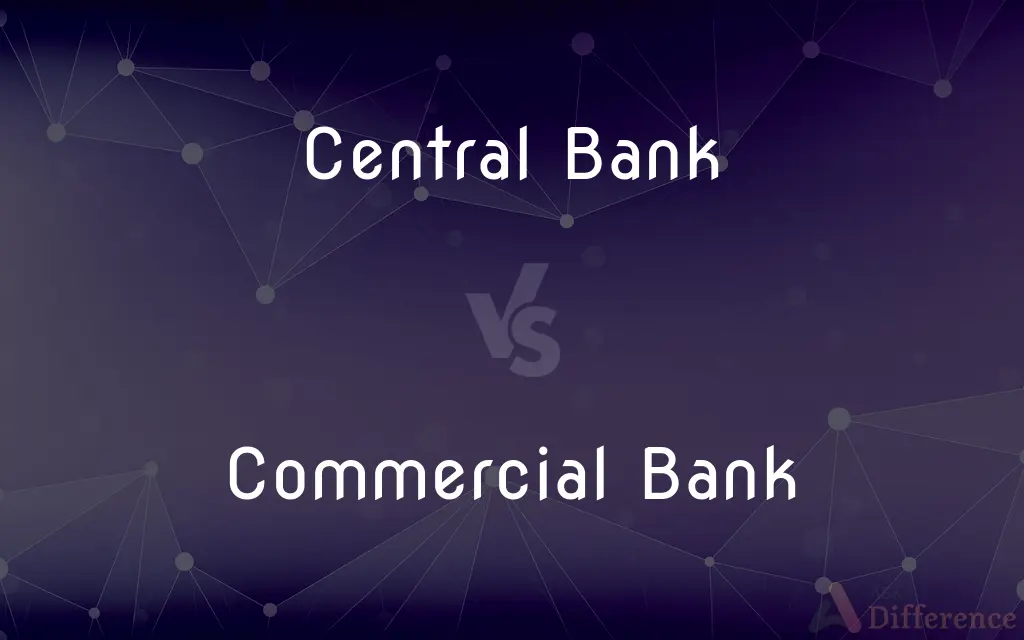Central Bank vs. Commercial Bank — What's the Difference?
By Tayyaba Rehman — Published on October 17, 2023
A Central Bank is a nation's primary monetary authority controlling monetary policy, while a Commercial Bank offers financial services to the public and businesses.

Difference Between Central Bank and Commercial Bank
Table of Contents
ADVERTISEMENT
Key Differences
A Central Bank is an institution responsible for a country's monetary policy, including issuing currency and regulating money supply. Conversely, a Commercial Bank is a financial entity that offers a variety of services such as accepting deposits, granting loans, and more to individuals and businesses.
The Central Bank, being a nation's chief financial institution, often holds reserves and implements policy to stabilize or stimulate economic growth. On the other hand, a Commercial Bank's primary focus is to earn profit by lending money at higher interest rates than they pay for deposits.
Central Bank actions like adjusting interest rates or engaging in open market operations have broad impacts on a country's economy. In contrast, a Commercial Bank operates within the parameters set by the Central Bank, focusing on customer-specific services and transactions.
The Central Bank is typically a government-owned or -controlled entity, ensuring economic stability and steering fiscal strategy. A Commercial Bank, however, usually operates as a for-profit business, serving customers and shareholders alike.
Central Banks play an essential role in setting the direction for a nation's financial health, laying the foundation for economic policies. Meanwhile, Commercial Banks play their part by facilitating daily transactions, providing credit, and supporting economic activity at the grassroots level.
ADVERTISEMENT
Comparison Chart
Primary Role
Governs monetary policy of a country
Provides financial services to the public
Ownership
Often government-owned or -controlled
Typically for-profit and privately owned
Function
Regulates money supply, issues currency
Accepts deposits, grants loans
Economic Impact
Shapes macroeconomic policies
Facilitates daily transactions, supports economy
Customer Base
Not customer-facing; interacts with commercial banks
Serves individuals, businesses, and corporations
Compare with Definitions
Central Bank
A nation's chief financial institution overseeing monetary policy.
The Federal Reserve is the Central Bank of the United States.
Commercial Bank
A financial institution offering banking services to the public.
I opened a savings account at my local Commercial Bank.
Central Bank
Governs the financial system ensuring economic stability.
The Central Bank lowered interest rates to stimulate economic growth.
Commercial Bank
Provides essential financial infrastructure for an economy.
The Commercial Bank's new branch will facilitate trade in the region.
Central Bank
Typically non-profit, focusing on national economic objectives.
The Central Bank's decisions prioritize the country's economic health over profits.
Commercial Bank
Operates to earn profits from financial activities.
The Commercial Bank announced impressive quarterly profits.
Central Bank
Responsible for issuing and regulating a country's currency.
The Central Bank decided to print more money to combat deflation.
Commercial Bank
Grants loans, accepts deposits, and provides related services.
The Commercial Bank approved my mortgage application.
Central Bank
Sets the regulatory framework within which other banks operate.
New guidelines were released by the Central Bank to ensure fiscal safety.
Commercial Bank
Works within regulations set by the country's Central Bank.
The Commercial Bank adjusted its loan rates according to Central Bank guidelines.
Common Curiosities
Who owns the Central Bank?
Central Banks are often government-owned or -controlled entities.
How does a Commercial Bank make money?
Commercial Banks earn profits by charging higher interest on loans than they pay on deposits.
What is a Central Bank?
A Central Bank is a country's primary financial institution responsible for monetary policy and currency regulation.
How does a Commercial Bank differ from a Central Bank?
A Commercial Bank provides financial services to individuals and businesses, while a Central Bank governs a nation's monetary policy.
Can I open an account at a Central Bank?
Typically, no. Central Banks are not customer-facing, while Commercial Banks offer such services.
Can a Central Bank go bankrupt?
While theoretically possible, in practice, Central Banks have measures and backing to prevent such scenarios.
Why is the Central Bank important for an economy?
Central Banks ensure economic stability, control inflation, and implement monetary policies to support growth.
What services can I expect from a Commercial Bank?
Commercial Banks offer services like savings and checking accounts, loans, credit cards, and more.
Why do Central Banks hold foreign reserves?
Central Banks hold foreign reserves to stabilize or influence their currency's value and ensure economic stability.
Can a Commercial Bank print money?
No, only the Central Bank has the authority to issue (or print) the national currency.
How many Commercial Banks can a country have?
There's no set limit; a country can have multiple Commercial Banks based on market dynamics and regulatory approvals.
Does a Central Bank provide loans to individuals?
No, Central Banks don't deal with individuals for such services; that's the role of Commercial Banks.
Who regulates Commercial Banks?
Commercial Banks are regulated by the country's Central Bank and other financial regulatory bodies.
How does a Central Bank combat inflation?
Central Banks can use tools like raising interest rates or selling government bonds to reduce money supply and combat inflation.
Do Commercial Banks need approval from the Central Bank to operate?
Yes, Commercial Banks operate under a license and regulatory framework set by the Central Bank.
Share Your Discovery

Previous Comparison
Distress vs. Suffering
Next Comparison
Intricate vs. SimpleAuthor Spotlight
Written by
Tayyaba RehmanTayyaba Rehman is a distinguished writer, currently serving as a primary contributor to askdifference.com. As a researcher in semantics and etymology, Tayyaba's passion for the complexity of languages and their distinctions has found a perfect home on the platform. Tayyaba delves into the intricacies of language, distinguishing between commonly confused words and phrases, thereby providing clarity for readers worldwide.
















































